Convergence Programme: Croatia's Economy to Rise 5.2% in 2021, 6.6% in 2022
ZAGREB, 29 April (Hina) - The Croatian government expects the national economy to rise at a rate of 5.2% in 2021, which is 0.3 percentage points more than its previous forecast, the government said at its meeting on Thursday when it adopted the 2022-2024 Convergence Programme.
Economic activity is expected to pick up at a rate of 6.6% in 2022.
The Convergence Programme is a document that is adopted on a regular basis in dialogue with the European Union's institutions as part of the European semester.
This year's document also deals with macroeconomic, fiscal and other economic effects of the draft National Recovery and Resilience Plan (NPOO), which was forwarded today to the European Commission for final fine-tuning.
Addressing the meeting, Finance Minister Zdravko Marić said that the effects of the NPOO raised the projected growth rate by 0.3 percentage points. Furthermore, growth of 6.6% and 4.1% is forecast for 2022 and 2023 respectively,
The finance minister said that these rates have 1.5 percentage points of the effects made by the National Recovery and Resilience Plan.
In 2024 the economy is expected to rise at a rate of 3.4%.
Marić pointed out growing commodity and services exports as a positive contribution to the growth.
Domestic consumption and investments will also give tailwinds to the growth.
2021 budget gap at 3.8% to narrow in coming years
The projections from the Convergence Programme, including the fiscal elements, will serve as an input in the preparation of the budget revision, the minister said.
Concerning the expenditure side, the minister pointed out the costs incurred due to the COVID-19 epidemic, which have reached HRK 32 billion.
He said that in 2020, HRK 14.1 billion was used to offset the pandemic and an additional 8.6 billion this year. Of that amount, the largest portion was used for the job retention scheme, including grants for job-keeping measures, shortened working hours, and the coverage of the fixed costs of enterprises.
In the healthcare system, the COVID-related costs covered the procurement of coronavirus tests and now vaccine supplies, Marić added
Therefore, the initial plan of this year's budget gap of 2.9% has widened to 3.8% of GDP, the minister explained.
In 2022, the budget gap should be within the limits set by the Maastricht criteria (-2.6%), and in 2023 it would narrow to 1.9% and further to 1.5% in 2024, according to the minister's explanation.
Marić recalled that Croatia had left the excessive deficit procedure in 2017 and was no longer in the group of countries with excessive economic imbalances, regaining the status of a creditworthy country. He also underscored Croatia's aspirations to adopt the euro.
For more about business in Croatia, follow TCN's dedicated page.
Gov't and Drug Wholesalers Reach Deal on Debt Settlement
ZAGREB, 14 April, 2021 - Health Minister Vili Beroš said on Wednesday that the government and representatives of drug wholesalers had reached agreement on a debt settlement scheme.
The issue of the debt made the wholesalers restrict and defer the deliveries of medicines to hospitals in late March.
"Today's meeting is one more step towards the debt settlement," Minister Beroš said adding that only together the two sides could solve this decades-long issue which became exacerbated during the COVID-19 pandemic.
Finance Minister Zdravko Marić outlined the elements of the scheme.
In the next three months we will transfer some funds to the Croatian Agency for Health Insurance (HZZO), and the Health Ministry so as to enable the cash flow in those institutions and enable them to pay liabilities towards wholesalers and providers, Marić said adding that those funds would be ensured through the redirection and reallocation of outlays in the state budget.
The monthly allocation for hospitals will be HRK 600 million and an additional 300 million for pharmacies.
In June, the government is likely to conduct a budget revision whereby an additional cash inflow for hospitals and pharmacies will be ensured so that debt deferment period lasts no longer than 180 days for hospitals and 120 days for pharmacies.
In June alone, 135 million kuna will be directed to pharmacies and HRK 760 million to hospitals, with the plan to respect the deferment periods in the remainder of the year.
Marić hopes that this scheme will remove any need for any new meeting with wholesalers on the debt.
The finance minister also expects reform efforts in preventing any further accumulation of liabilities and in this context he mentioned the plan to cut the deferment period to 60 days.
The wholesalers' representative Diana Percač thanked the ministers for efforts to provide funds to cover the debt.
She also pledged the continuation of the delivery of drugs to pharmacies until the end of this year.
(€1 = HRK 7.571658)
For more about politics in Croatia, follow TCN's dedicated page.
PM Andrej Plenković: Part of Debt to Drug Wholesalers to be Paid in Days Ahead
ZAGREB, 30 March, 2021 - Prime Minister Andrej Plenković said on Tuesday that Finance Minister Zdravko Marić and Health Minister Vili Beroš would meet with drug wholesalers over the debt for drugs and that a certain amount would be paid in the days ahead.
Representatives of drug wholesalers, pharmacists and drug manufacturers warned last week that the supply of medicines could be restricted due to the HRK 6.5 billion debt, and the Medika company today suspended deliveries to hospitals.
Visiting Osijek-Baranja County, Plenković told press this was a usual situation. "Every once in a while, when an important date is due, whether Christmas, Easter or election day, wholesale drug suppliers unanimously start asking for the money they are due."
"We'll talk about it, the ministers of finance and health will meet with them and certain funds will be paid in the days ahead."
Asked about the payment date, Plenković said the ministers would discuss it. "I'm not an accountant to talk with them about the exact payment date."
The CEO of Oktalpharma, Ivan Klobučar, supported Medika's move, telling N1 television that the government, the Health Ministry, the Croatian Health Insurance Fund and Minister Beroš had been ignoring their appeals for a meeting for three months.
He said the situation was such that those responsible would see how difficult the situation was when "patients and others who are not at fault at all bear the brunt." If someone urgently needs a medicine, they will not get it, he added.
For more about politics in Croatia, follow TCN's dedicated page.
Faculty of Economics University of Zagreb Celebrates 100 Years
ZAGREB December 5, 2020 – With over 9000 students currently enrolled, the Faculty of Economics University of Zagreb is the largest faculty in Croatia. In 2020, this internationally renowned institution celebrates its 100th birthday, so TCN decided to take a closer look.
Every other student you meet in Croatia seems to study economy. It makes you wonder where they all go to after their studies are complete. Are there really so many positions for economists in Croatia?
In 2020, the Faculty of Economics University of Zagreb celebrates its 100th birthday. The long list of its famous former students gives a clue to where all the Croatian economists go – the tourism sector, diplomacy and international relations, business, politics and government.
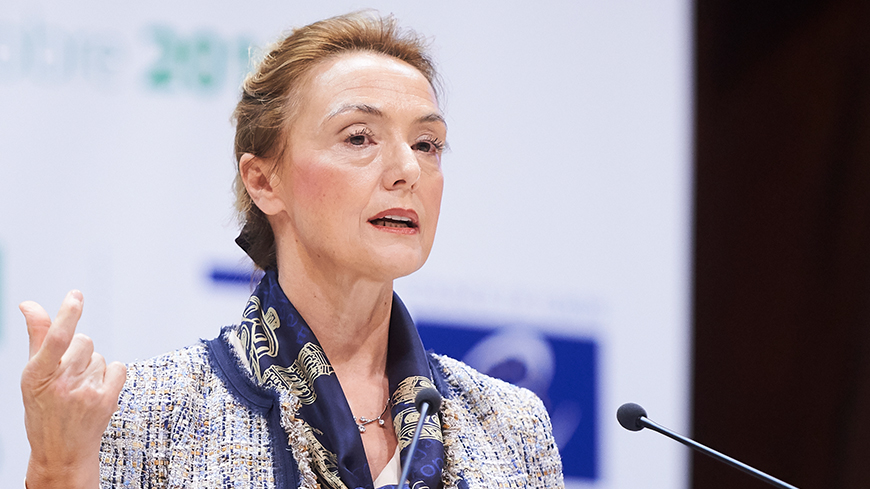 Marija Pejčinović Burić, a graduate of the Faculty of Economics of the University of Zagreb and the current Secretary General of the Council of Europe. After graduating, like Savka Dabčević-Kučar, she became o doctor of economics and before taking her current position served as Croatia's Deputy Prime Minister and Minister of Foreign and European Affairs © Council of Europe
Marija Pejčinović Burić, a graduate of the Faculty of Economics of the University of Zagreb and the current Secretary General of the Council of Europe. After graduating, like Savka Dabčević-Kučar, she became o doctor of economics and before taking her current position served as Croatia's Deputy Prime Minister and Minister of Foreign and European Affairs © Council of Europe
Graduates of the Faculty of Economics University of Zagreb have served as mayors of Zagreb and Split, Deputy Prime Minister of Croatia, Minister of Finance, Minister of the Economy, Secretary-General of the Council of Europe, Governers of the Croatian National Bank, Vice-President of the UN World Food Council, President of the Croatian Football Association, Minister of Environmental and Nature Protection, special advisors to the President of Croatia and countless university professors, including several former rectors of the University of Zagreb. Within its graduate professors, it has produced no less than 19 full members of the prestigious Croatian Academy of Sciences and Arts, more than any other single institution in the country.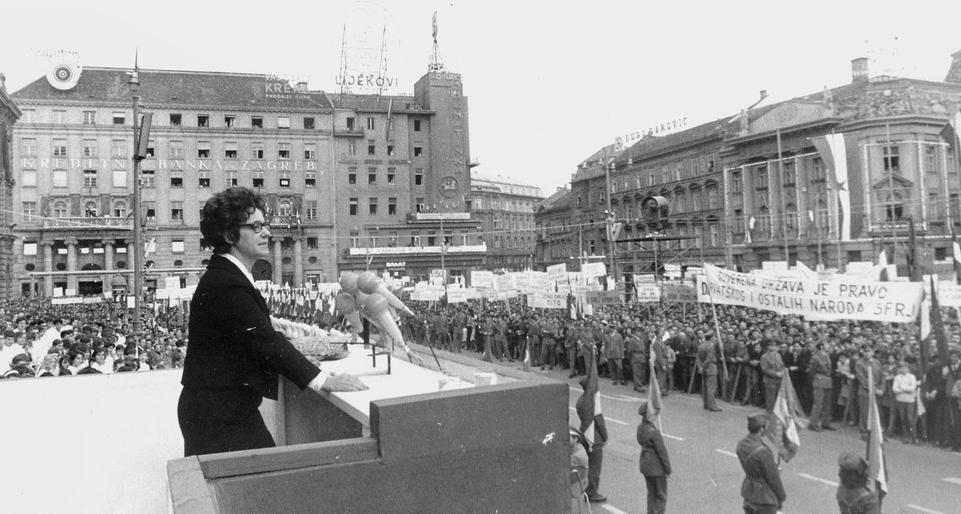 Savka Dabčević-Kučar, a graduate of the Faculty of Economics of the University of Zagreb. Born on Korčula, she became an anti-fascist in World War II, joining the partisans after her brother was beaten by fascists. After graduating, she continued to study at the faculty and became one of the first doctors of economics in Croatia, raising eyebrows by choosing to write her doctorate dissertation about a non-Marxist economic theorist (Englishman John Maynard Keynes). She became a professor at the faculty in the 1950s and despite her great advances in political life, remained a committed teacher at the faculty until 1971. In 1967, she was elected President of the Socialist Republic of Croatia. In 1969, she moved to an even more important position - that of president of the Central Committee of the League of Communists of Croatia. She was the first woman in Europe to be appointed head of government of a political entity and the first female in Croatia to hold an office equivalent to a head of government. In this picture, she addressed supporters on Ban Jelacic Square Zagreb during the movement called the Croatian Spring, which called for greater autonomy for Croatia. At the address, thousands cheered her as “Savka, queen of the Croats”. For her pivotal role in the movement, she was removed from her positions and public life and retired. She returned to politics in 1990 upon the collapse of communism in Europe and during the Croatian war of independence was one of the few politicians who visited the front lines of battle in Slavonia, Petrinja, Pokupski and the Dalmatian hinterland
Savka Dabčević-Kučar, a graduate of the Faculty of Economics of the University of Zagreb. Born on Korčula, she became an anti-fascist in World War II, joining the partisans after her brother was beaten by fascists. After graduating, she continued to study at the faculty and became one of the first doctors of economics in Croatia, raising eyebrows by choosing to write her doctorate dissertation about a non-Marxist economic theorist (Englishman John Maynard Keynes). She became a professor at the faculty in the 1950s and despite her great advances in political life, remained a committed teacher at the faculty until 1971. In 1967, she was elected President of the Socialist Republic of Croatia. In 1969, she moved to an even more important position - that of president of the Central Committee of the League of Communists of Croatia. She was the first woman in Europe to be appointed head of government of a political entity and the first female in Croatia to hold an office equivalent to a head of government. In this picture, she addressed supporters on Ban Jelacic Square Zagreb during the movement called the Croatian Spring, which called for greater autonomy for Croatia. At the address, thousands cheered her as “Savka, queen of the Croats”. For her pivotal role in the movement, she was removed from her positions and public life and retired. She returned to politics in 1990 upon the collapse of communism in Europe and during the Croatian war of independence was one of the few politicians who visited the front lines of battle in Slavonia, Petrinja, Pokupski and the Dalmatian hinterland
The Faculty of Economics University of Zagreb is the largest faculty in the country. Over its 100 year history, it has established itself as an internationally respected institution. Today, it has around 9000 persons enrolled, caters for international students with some courses in English and has produced over 86, 000 graduates, including 856 doctors of science.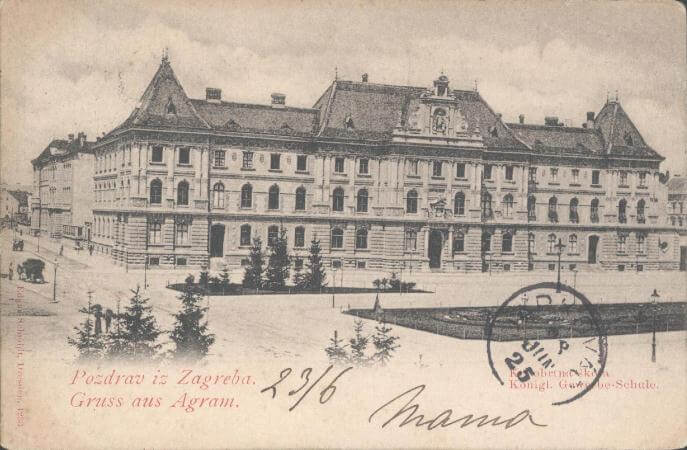 In its infancy, students of the College of Trade and Transport were taught at the Technical College, which is today the Museum of Arts and Crafts in Zagreb © National and University Library in Zagreb
In its infancy, students of the College of Trade and Transport were taught at the Technical College, which is today the Museum of Arts and Crafts in Zagreb © National and University Library in Zagreb
The history of the Faculty of Economics University of Zagreb starts with the opening in 1920 of its forerunner, the Zagreb College of Trade and Transport. Its purpose was to educate in the areas of banking, domestic and international trade, transport, consular services, insurance and the education of teachers. Its courses lasted three years and it proved so popular that in the academic year 1923/24, some 1,125 students were enrolled.
The institution held college status until 1925 when Stjepan Radić became the Minister of Education. It must have been unusual for Radić to find himself as part of the government of the Kingdom of Serbs, Croats and Slovenes, the state which preceded the Kingdom of Yugoslavia. Today, Radić is best remembered as a politician outspoken in his advocacy of autonomy for Croatia. Before his appointment to the government, he had always done so in opposition. Indeed, he had been imprisoned several times for his views, which were proclaimed loudly in his writings or in person (he was a gifted public speaker). As recently as March 1925 he had been in prison but, when the political party of which he was a member officially recognised the monarchy and the state constitution, he was freed. In a remarkable turnaround, before the year's end, he was a minister in the government.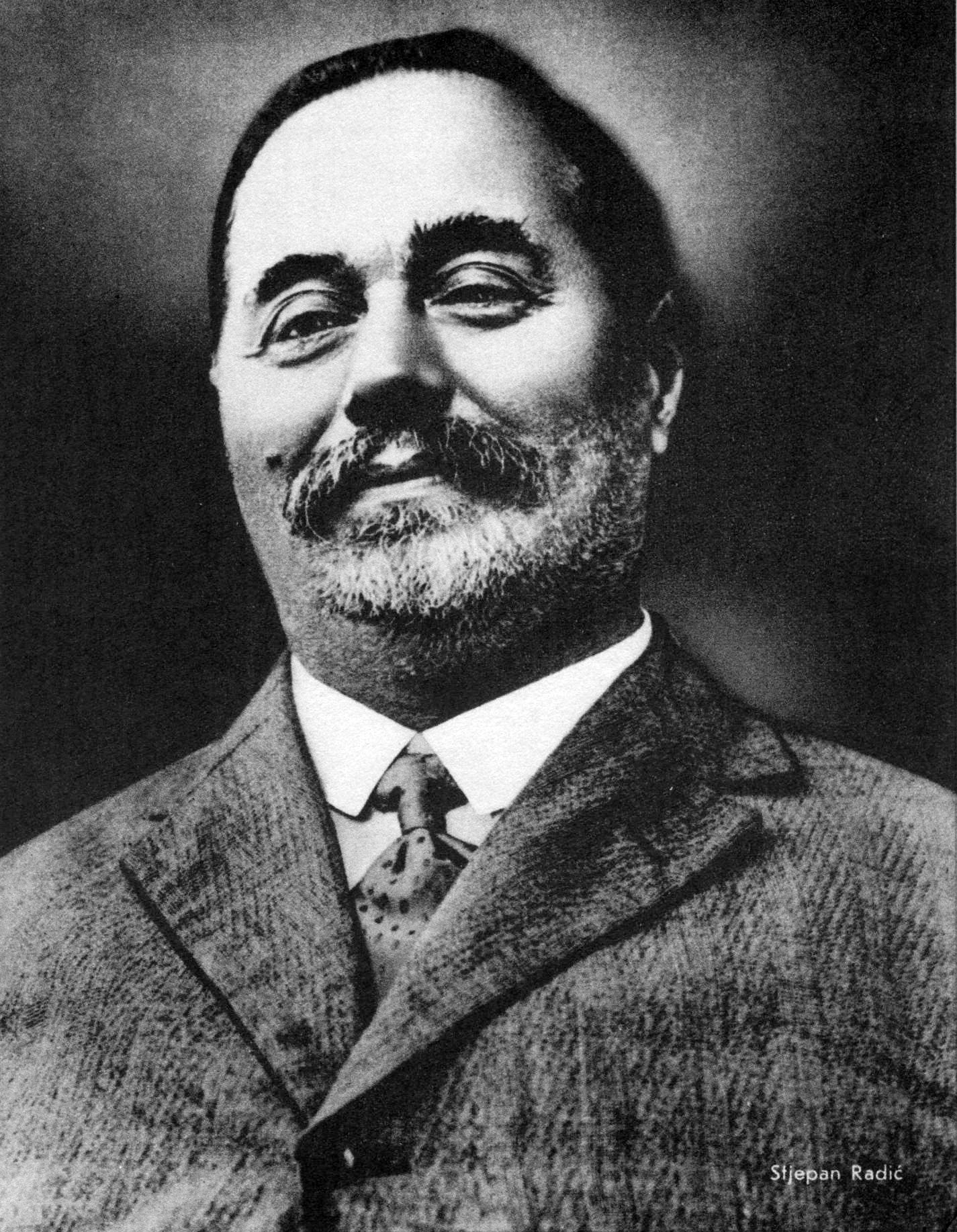 Stjepan Radić, pictured in the 1920s © public domain. In 1895 Radić was sent to prison for the public burning of the Hungarian flag in Zagreb – alongside Antun Dabčević, the father of Savka Dabčević-Kučar.
Stjepan Radić, pictured in the 1920s © public domain. In 1895 Radić was sent to prison for the public burning of the Hungarian flag in Zagreb – alongside Antun Dabčević, the father of Savka Dabčević-Kučar.
Stjepan Radić's desire for Croatian autonomy was not born from the ideals of the political class of Zagreb. The ninth of eleven children, born to a peasant family in a small village on the banks of the Sava river, just north of Sisak, Radić was very much a representative of the people whence he came. To him (and others in his family – his brother and nephew also being prominent politicians), education had the most important role to play in emancipation. He had lived in poverty in order to complete his own - after being banned from university-level educational institutions throughout the whole of the Austro-Hungarian empire for his protests against the state, he travelled penniless to Russia, France and Switzerland to complete his studies. In the latter, finance was one of his chosen subjects.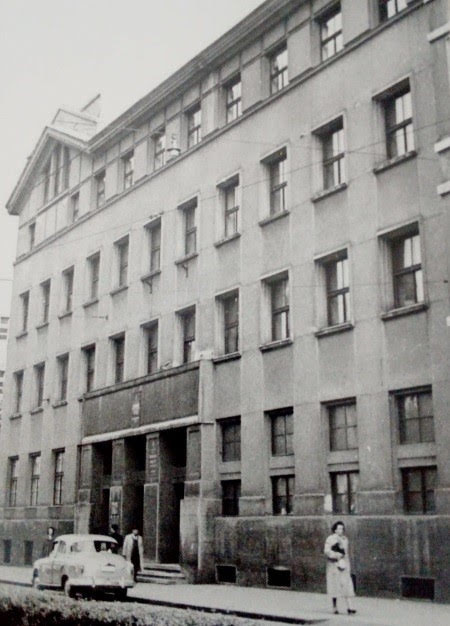 The first dedicated building of the Higher School of Economics and Commerce was located on the corner of Bauerova and Zvonirmirova © Faculty of Economics University of Zagreb
The first dedicated building of the Higher School of Economics and Commerce was located on the corner of Bauerova and Zvonirmirova © Faculty of Economics University of Zagreb
Under Radić's spell in office, the Zagreb College of Trade and Transport became the Higher School of Economics and Commerce. Its courses extended to four years, it attained university status. With no building designated to the increasingly popular institution, students had sometimes been taught at the Technical College (today's Museum of Arts and Crafts) and in parts of what is now the Mimara Museum. A dedicated home for the faculty was authorised and its construction started in 1927. Classes began at the faculty, located on the corner of Bauerova and Zvonimirova, in 1928, but within the decade the institution had outgrown its home and a plot of land in Svetice was acquired in order to build a new, larger facility. Its construction was interrupted by the Second World War and students would end up being taught on the Bauerova and Zvonimirova site all the way up to 1952.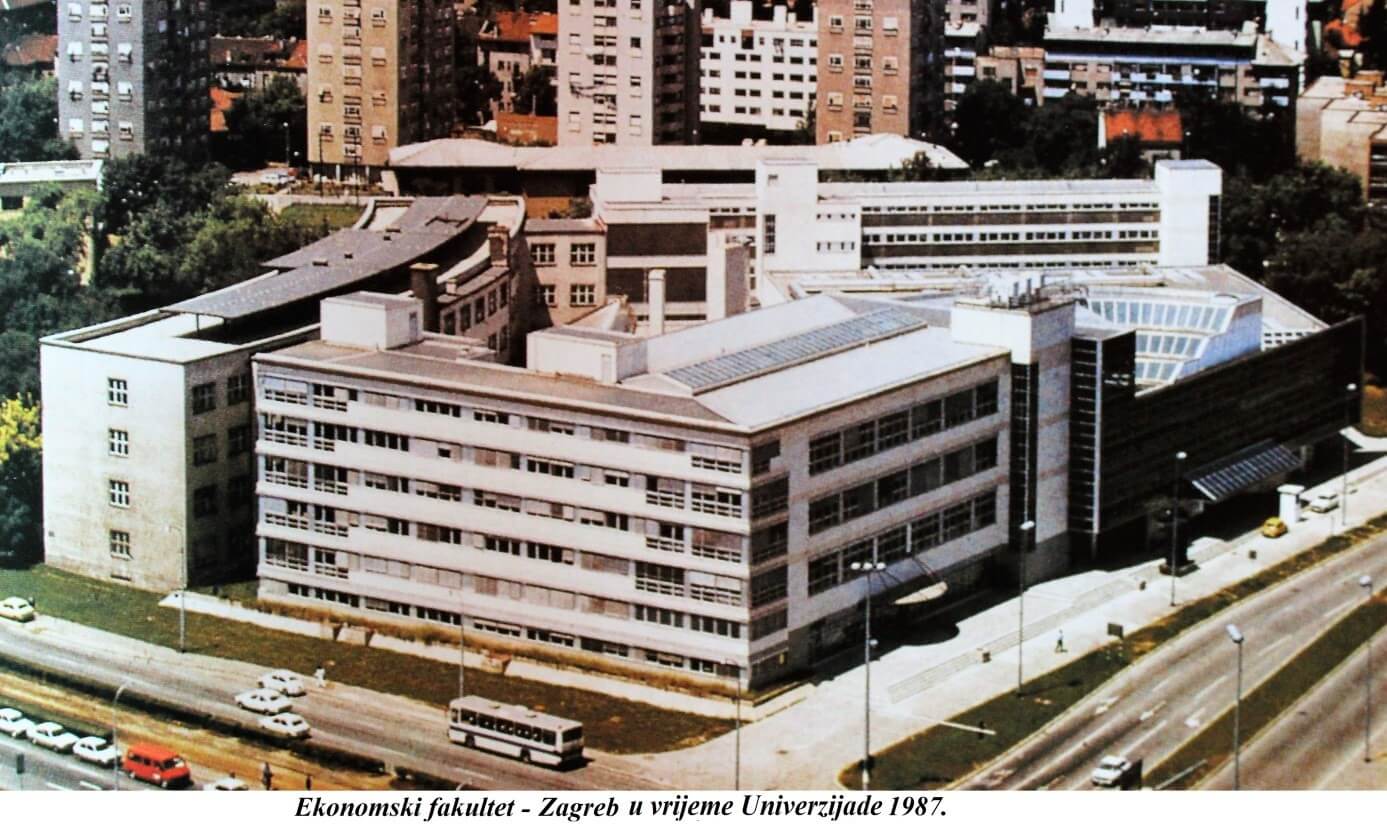 The faculty's modern building, pictured in 1987. Today, the faculty has 17 departments - Finance, Demography, Economic Theory, Business Economics, Informatics, Macroeconomics and Economic Development, Marketing, Mathematics, International Economics, Business in Foreign Languages, Organization and Management, Law, Accounting, Statistics, Trade and International Business, Tourism, Physical Education and Health © Faculty of Economics University of Zagreb
The faculty's modern building, pictured in 1987. Today, the faculty has 17 departments - Finance, Demography, Economic Theory, Business Economics, Informatics, Macroeconomics and Economic Development, Marketing, Mathematics, International Economics, Business in Foreign Languages, Organization and Management, Law, Accounting, Statistics, Trade and International Business, Tourism, Physical Education and Health © Faculty of Economics University of Zagreb
In 1947, the Higher School of Economics and Commerce became the Faculty of Economics University of Zagreb. In 1952, the faculty officially moved to the new site in Svetice. In 1968 it expanded once more when it merged with the 12-year-old College of Economics. Since then, the building at Svetice has received major upgrades and further facilities of the faculty can now also be found at the university campus in Borongaj, in Varaždin, in Koprivnica and in Bjelovar. After a century of existence, the Faculty of Economics University of Zagreb's longstanding difficulties to meet the popularity of its courses with the space available are now over. Not only can they accommodate every Croatian economy student who makes the grade, but they are also able to offer places to some of the best international students. It would surely come as no surprise if they are still educating the future elites of business, banking, finance and politics in another 100 years.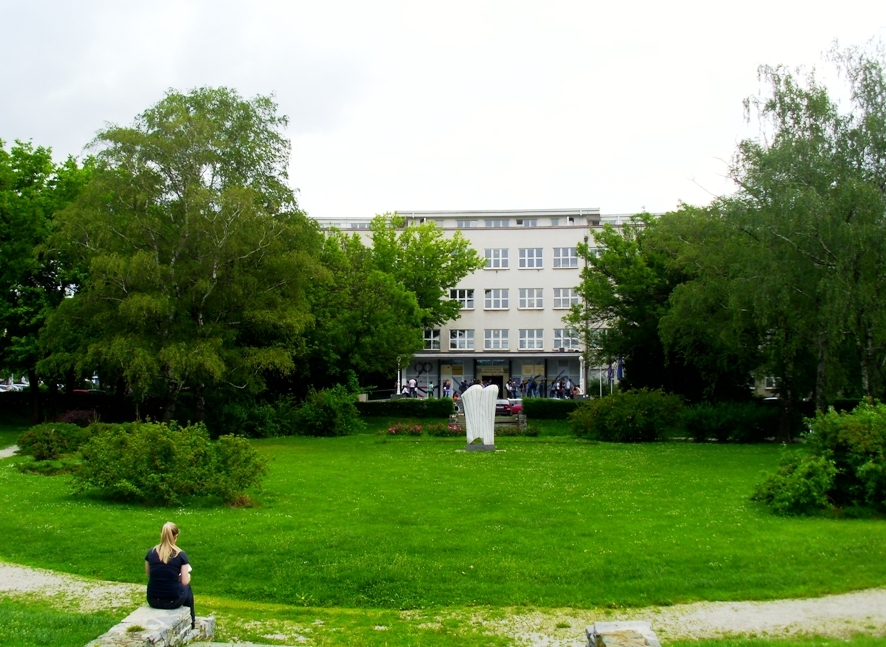
The Faculty of Economics University of Zagreb site in Svetice, as seen from its garden © Wolf - Pidgeon
Restaurant and Cafe Owners Stage Protest Rally in Front of Finance Ministry
ZAGREB, November 30, 2020 - Dozens of restaurant and cafe owners whose businesses had to close last weekend due to new epidemiological restrictions expressed their dissatisfaction on Monday by staging a peaceful protest rally and lighting lanterns outside the Ministry of Finance.
The protest rally started before noon at Zagreb's main Trg Bana Jelacica square and ended at about 1 p.m., and the protesters estimate that there were several dozens of them.
From the main square, the protesters walked to Katanciceva Street, where the Finance Ministry's building is located, and they lit lanterns in front of the building.
The rally was not organised by any association, the protesters said, adding that it was a spontaneous gathering to protest against closing hospitality and other establishments, such as gyms, and to protest because tighter restrictions were introduced last weekend and operating was made difficult, which puts the survival of businesses, employees and owners themselves at risk.
Drazen Orescanin, representative of the Voice of Entrepreneurs association, said that the gathering was spontaneous and that they were waiting for the results of the meeting between hospitality stakeholders and entrepreneurs with ministers at the Ministry of Labour and Pension System, but what the government was offering was not in line with their requests, according to what he had heard.
"We will keep asking for the compensation to be fair and in accordance with other EU countries, so that everyone who had a significant drop in business is eligible. We also continue our fight for the survival of the economy, for which it is necessary to reduce the VAT rate and for government to make substantial reforms," Orescanin said.
In addition to owners of restaurants and cafe bars, owners of gyms, fitness clubs and others whose businesses cannot operate now also took part in the protest rally, warning that they can no longer survive in the new circumstances.
FinMin Presents Three Measures to Help Entrepreneurs
ZAGREB, November 30, 2020 - Finance Minister Zdravko Maric presented on Monday, after talks with employers' and entrepreneurs' associations, three measures to help entrepreneurs whose businesses are closed due to new epidemiological measures, including job-retention measures, "COVID loans" and covering fixed costs.
The government, he said, will continue paying HRK 4,000 per worker under the job-retention scheme, and HRK 470 million has been provided for that purpose for the period until the end of the year.
"COVID loans" for liquidity, totalling HRK 1.3 billion, will remain to be available for "closed" business, which are the priority, and for other businesses, as well.
The third measure will cover entrepreneurs' fixed costs, or part of them, such as rent, lease, RTV subscription, monument annuity, music licensing fee, etc.
The decline in turnover in December will be compared to last year's results, the minister said, with businesses that have seen a drop in turnover of at least 60% being eligible for the measure, and the Tax Administration will be in charge of administration, based on fixed costs invoices.
Representatives of hospitality stakeholders said the measures were too weak and insufficient, noting especially that it is necessary to reduce VAT.
EU Recovery Plan Big Opportunity for Croatia - Conference
ZAGREB, November 16, 2020 - The EU recovery plan is a big opportunity for Croatia, which has four or five key years to use, European aid from various funds through good projectsfor a relatively quick recovery from the corona crisis and for economic growth and development, a conference heard on Monday.
The videoconference on the EU recovery plan was organised by the European Investment Bank, the European Commission Representation in Croatia and Hanza Media, and its goal is to create a stimulating environment and platform for raising awareness of the opportunities offered by the EU recovery plan, with special focus on financing sustainable and climate-friendly projects.
EU leaders agreed in July on a comprehensive recovery plan for Europe. The Next Generation EU plan was adopted in synergy with the multiannual financial framework (MFF) 2021-2027, and it should repair the economic and social damage caused by the coronavirus pandemic, kick-start European recovery and protect and create new jobs.
Slightly over €12.6 billion from the new MFF and €9.4 billion from the Next Generation EU instrument will be available to Croatia.
Finance Minister Zdravko Maric expects a new investment cycle in Croatia, also thanks to EU assistance, as well as a relatively quick recovery.
European Commissioner for Economy Paolo Gentiloni said that Europe had started to recover in the third quarter of 2020, but then a new wave of the epidemic started.
According to him, EU countries will see an average economic decline of 7.4% this year, and next year they will recover at an average rate of 4.1%.
He added that differences between EU member states were noticeable, and that countries dependent on tourism and hospitality activities were affected more.
So far, the EU has had an adequate response to all challenges caused by the pandemic, Gentiloni said, adding that Croatia will be one of the biggest recipients of EU recovery aid.
Every state is preparing its own plans for reforms and investments, and those national plans must be in accordance with the EU plans. Most of the funding should be used for digital and green projects.
Vice-President of the European Investment Bank, Dario Scannapieco, focused on the climate plan in his presentation, saying that by 2050 the green transition will open half a million new jobs in Europe.
Majority of Salaries Will be Taxed 20%, Says Daily
ZAGREB, November 9, 2020 - As of next year, Croatia will tax a majority of salaries only 20%, plus local tax, which is four percentage points less than now, Vecernji List daily said on Monday.
The government believes this change will reduce the tax burden on salaries by HRK 2 billion annually, the paper said.
How much each employed person will benefit from the cut depends on their gross salary and deductions for children and other dependent family members.
Income tax is paid by all employed persons as well as the jobless who do part-time work and pensioners whose allowance exceeds HRK 4,000.
Finance Minister Zdravko Maric says two-thirds of those liable for income tax actually do not pay it because their income is below the taxation threshold when deductions for dependent family members are added to their non-taxable monthly income (HRK 4,000) .
Those not paying income tax cannot expect anything from the tax rate cuts going into force as of January 1, which has been a source of numerous frustrations and dissatisfaction for a long time. From every salary, regardless of its amount, is first deducted 20% for pension contributions, while the rest is considered as income. Those whose gross salary is below HRK 5,000 do not pay income tax, only HRK 1,000 for pension contributions.
Additional deductions make the difference even more pronounced. If a worker with a gross salary of over HRK 10,000 has two children who bring an additional HRK 4,250 in tax deductions, there is nothing to deduct, so they cannot expect the reduction of the income tax rate to 20% will result in a higher salary as of January 1.
Children and dependent family members bring big deductions due to which parents with two or more children generally do not pay income tax. Reducing the income tax rate from 24 to 20% could result, for an employed Zagreb resident with an average gross salary of HRK 9,200 without children or dependents, in a HRK 160 higher monthly salary as of January 1, Vecernji List said.
(€1 = HRK 7.5)
Croatia to Receive €1.02bn from EU SURE Instrument
ZAGREB, October 22, 2020 - By the end of this year Croatia will receive €490 million from the EU SURE instrument for temporary support to mitigate unemployment risks in an emergency following the outbreak of the coronavirus pandemic, the government said on Thursday, adding that a total of €1.02 billion has been approved for Croatia.
At today's cabinet meeting, Finance Minister Zdravko Maric was authorised to sign a loan agreement with the EU for this temporary support.
The SURE instrument was established by decision of the Council of the EU in May with the aim of providing financial assistance of up to €100 billion in the form of loans from the EU to affected member states to address sudden increases in public expenditure for the preservation of employment.
To finance these loans, the European Commission will borrow money on financial markets and lend it to member states under favourable terms. The first tranche of €17 billion was conducted a few days ago, and the interest was ten times higher, Maric said.
"The instrument is designed for short work time schemes and similar measures to help member states protect jobs and employed and self-employed people from the risk of unemployment and loss of income. All member states have signed a guarantee agreement to date, whereby the SURE instrument has become operational," Maric said.
He said that Croatia had applied for this funding to address sudden and serious increases in expenditures connected with subsidies to preserve jobs and support for shorter work time.
"A loan of €1.02 billion is available to Croatia, with a maximum average maturity of 15 years and an availability period for financial support of 18 months. Financial support can be used through a maximum of eight instalments which can be paid by one or more tranches. These are very favourable loans, and a total of €490 million will be paid to Croatia by the end of this year, which will be included in the budget revision and which is about 48% of the allocation," Maric said.
The government also decided to include micro and small businesses in the state aid programme for the sea, transport and transport infrastructure sector to help them cope with the crisis caused by the coronavirus pandemic.
FinMin Violated the Principle of Good Conduct, The Conflict of Interest Commission Says
ZAGREB, Sept 11, 2020 - The Conflict of Interest Commission found on Friday that FinMin violated the principle of good conduct by participating in a decision by the Croatian Bank for Reconstruction and Development (HBOR) to grant a loan to a company owned by his friend Josip Stojanovic Jolly.
The procedure against Maric was launched in December last year due to the possibility of bias because, in his capacity as finance minister and president of the HBOR supervisory board, he did not excuse himself from the decision to issue a loan to Stojanovic's Olympia Vodice company, which was issued with an HBOR loan for the construction of a hotel even though he had made it clear in his statements to the media that Stojanovic was a friend of his.
The commission decided on Friday that Maric was not in conflict of interest but rather that he had violated the principle of good conduct, which is not subject to any penalty.
The commission also found that Maric had not violated the law by attending a World Cup match in Russia where he was seen in Stojanovic's company, as Maric provided evidence that he personally paid for his ticket.
In a second case, the commission found that Zagreb Mayor Milan Bandic and members of parliament who crossed the floor and joined his parliamentary group had not violated the law.
The commission decided on each individual member of parliament who crossed the floor and joined Bandic's party and whether they were rewarded for that with some counter-favor. The commission found that no violation had occurred with regard to the Conflict of Interest Act.
The procedure involved Mayor Bandic and Members of Parliament Marija Puh, Mladen Madjer, Milanka Opacic, and Sinisa Varga who crossed the floor in parliament, as well as Deputy Mayor of Donja Stubica Luka Grabusic and Radoboj Mayor Andjelko Topolovec who too joined Bandic's party.
For the latest travel info, bookmark our main travel info article, which is updated daily.
Read the Croatian Travel Update in your language - now available in 24 languages


